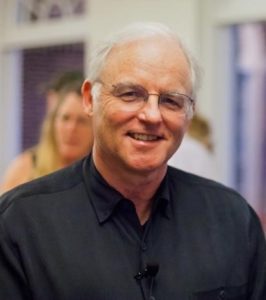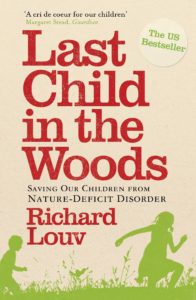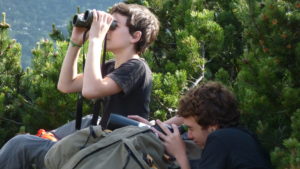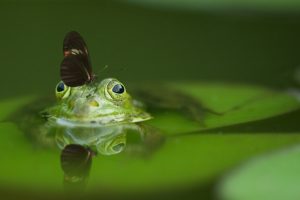Ten Reasons Why We Need a New Nature Movement
Junior Rangers in the Prealpi Giulie Nature Park © Leonardo Cerno
By Richard Louv

Richard Louv
Richard Louv is a bestselling author who sparked an international debate and movement to reconnect kids and nature, through his book Last Child in the Woods. He coined the term nature-deficit disorder which has influenced policy and inspired campaigns across North America.

Richard Louv LAst Child in the Woods
Climate change, biodiversity collapse, and the disconnect of children from nature are the greatest environmental challenges of our time — and all are interrelated.
The Nature-deficit disorder
In recent decades, children and adults around the world have become increasingly disconnected from nature, with profound implications for human health and child development – with indicated impacts on attention disorders, Vitamin D deficiency, myopia, childhood obesity and the growing epidemics of both inactivity and loneliness.
The great work of the remainder of the 21st Century will be the development of a new and positive relationship between human beings and the rest of the natural world.
When I wrote “Last Child in the Woods” about what I called nature-deficit disorder (not a known medical diagnosis, though perhaps it should be), I cited about 60 studies. The topic of the influence of the natural world on human development was, to say the least, understudied. Today, over 800 studies are abstracted in the Children & Nature Network’s research library, which is available to anyone in the world.
Specific to the nature-deficit disorder, five major barriers stand between humans, especially children, and the rest of the natural world.
- Urbanisation without nature.
- A media and politics-driven culture of Fear
- Digital dominance of our lives.
- Cultural and educational devaluing of the natural world
- The Dystopian Trance: a post-apocalyptic view of the future.
The good news is that attitudes about the nature connection are changing – not fast enough – but we now see pediatricians in the U.S. writing prescriptions for nature; we see a 500% increase in the number of nature preschools; family nature clubs spreading all over; and we see an international movement growing around the world.

Ten Reasons Why We Need a New Nature Movement
1) As of 2008, more than half of the world’s population lives in towns and cities. This transformation will produce one of two outcomes: either the end of meaningful daily experience in nature, or the beginning of a new kind of city – and a new view of our role in and our definition of nature.
2) Adults have nature-deficit disorder, too. The children and nature movement will not succeed unless adults come to see the importance of our own connection to the natural world.
3) Environmentalism needs to hit reset. Environmental concern, in some areas, has dropped to its lowest point since before Earth Day 1970. Why? Economic recession. A well-financed campaign of disinformation. An inability to describe a great future. For whatever reason, environmentalism remains a pup tent. We need a bigger tent. In fact, we need a river.
4) Sustainability alone is not sustainable. Though we don’t have a better word to replace it, the word sustainsuggests stasis. We need more than stasis; we need to produce human energy (health, intelligence, creativity, joy) through nature.
5) Conservation is not enough. Now we need to “create” nature. Even if we conserve every square foot of remaining wilderness, and we should, it won’t be enough to guarantee the biodiverse habitats that humans and other organisms will require to thrive. In addition to conservation, we must now restore or create natural habitats on our farms and ranches, in our cities, neighborhoods, commercial buildings, yards, and on our roofs. We’ll need the true greening of the urban world.

pixabay
6) The more high-tech we become, the more nature we need. We hear talk of a “post-biological” era in which human beings are optimally enhanced by technology. Yet, we’ve only begun to study how the natural world can optimize human health and intelligence. Technology will always be with us, but as it grows, we’ll need an antidote to its downside.
7) The Development of Hybrid Minds, ones capable of the ultimate multitasking: to live simultaneously in both the digital and physical worlds, using computers to maximize our powers to process intellectual data and natural environments to ignite our senses and accelerate our ability to learn and feel.
8) A New Nature Movement will create new jobs. Connecting nature experience directly to human health and cognitive abilities will need nature preschool teachers, physicians and therapists who specialise in the healing power of nature; biophilic architects, landscapers and city planners to start using native plants to increase biodiversity; park rangers to take on the additional role of health para-professional – and many more.
9) Connecting children to nature brings unlikely allies together. Conservatives, liberals, business people, environmentalists, teachers, pediatricians, and people of different religions will sit down at the same table.
10) We hunger for a positive image of the future. If we see only an apocalyptic future, that’s what we’ll get, or close to it. But imagine a society in which our lives become as immersed in nature as they are in technology, every day, where we live, work, learn and play. Imagine a future in which our intelligence and creativity, our ability to feel and be fully alive is enhanced by more frequent contact with the natural world.
You found this topic interesting? To find more articles like this one, download the new edition of the EUROPARC Journal Protected Areas In-Sight with a special focus on youth involvement Parks – available in english, german and french!